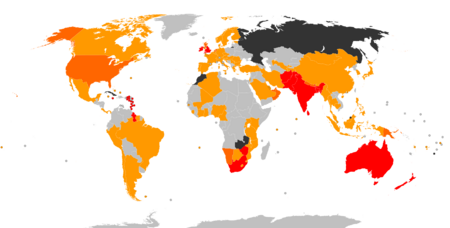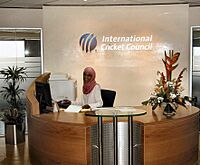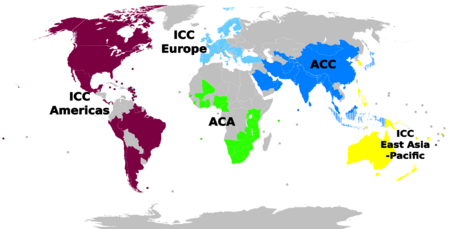International Cricket Council facts for kids
 |
|
| Abbreviation | ICC |
|---|---|
| Predecessor |
|
| Formation | 15 June 1909 |
| Type | International sport federation |
| Headquarters | |
|
Membership
|
110 members |
|
Official languages
|
English |
|
Chairman
|
Jay Shah |
|
Deputy Chairman
|
Imran Khwaja |
|
CEO
|
Sanjog Gupta |
|
General Manager
|
Wasim Khan |
|
Revenue (2023)
|
US$904.385 million |
| Expenses (2023) | US$208.375 million |
| Award(s) | ICC Awards |
The International Cricket Council (ICC) is the main organization that runs cricket around the world. It makes sure the game is played fairly and helps it grow. The ICC was started in 1909 as the Imperial Cricket Conference. Later, its name changed to the International Cricket Conference in 1965, and then to its current name, International Cricket Council, in 1987. The ICC's main office is in Dubai, United Arab Emirates.
The ICC has 110 member countries. These include 12 "full members" who play long Test matches, and 98 "associate members." The ICC organizes big international cricket events like the Cricket World Cup, T20 World Cup, and ICC World Test Championship. It also picks the umpires and referees for international games. The ICC has rules called the ICC Code of Conduct to make sure players act professionally. It also works to stop cheating and unfair play in cricket.
The ICC does not control friendly matches between countries. It also does not make the basic laws of the game. Those laws are managed by the Marylebone Cricket Club (MCC) since 1788. The ICC Chairman leads the board of directors. Sanjog Gupta became the CEO of the ICC on July 7, 2025. His job includes helping T20 leagues grow, keeping cricket formats strong, working to get cricket into the Olympics, and making the game more popular worldwide.
Contents
How the ICC Started
Early Days: 1909–1963
The idea for a global cricket board came from Abe Bailey of South Africa in 1907. He wrote to the Marylebone Cricket Club (MCC) in England. Bailey wanted a board to set rules for international matches between Australia, England, and South Africa. He also hoped to hold a special series of matches in South Africa.
Even though Australia said no at first, Bailey kept trying. He saw a chance when Australia visited England in 1909. On June 15, 1909, representatives from England, Australia, and South Africa met in London. They created the Imperial Cricket Conference. A month later, they agreed on rules and planned the first three-team Test series for 1912 in England.
In 1926, West Indies, New Zealand, and India joined as Full Members. This doubled the number of Test-playing nations to six. After Pakistan was formed in 1947, it became the seventh Test-playing nation in 1952. In 1961, South Africa left the Commonwealth and lost its membership for a while.
Growing Bigger: 1964–1988
In 1964, the ICC decided to let countries that didn't play Test matches join. The next year, the organization changed its name to the International Cricket Conference. The US, Ceylon (now Sri Lanka), and Fiji became the first "Associate" members. More countries like Denmark, Bermuda, Netherlands, and East Africa joined as Associates in 1968.
In 1969, the ICC updated its rules. In 1971, the idea of a World Cup was first discussed. By 1973, it was decided that the first World Cup would be held in England in 1975. The six Test-playing nations, plus East Africa and Sri Lanka, were invited to play.
Many new members joined during this time. Israel and Singapore joined in 1974, West Africa in 1976, Bangladesh in 1977, and Papua-New Guinea in 1978. South Africa tried to rejoin but was not allowed yet.
In 1981, Sri Lanka became a Full Member and played its first Test match in 1982. In 1984, a third type of membership, "Affiliate," was added. Italy was the first Affiliate member.
Modern Era: 1989–Present
In July 1989, the ICC changed its name again to the International Cricket Council. Also, the rule that the MCC President automatically became the ICC Chairman was stopped.
In 1990, the UAE joined as an Associate member. In 1991, for the first time, an ICC meeting was held outside England, in Melbourne, Australia. South Africa rejoined as a Full Member in July 1991 after apartheid ended.
In 1992, Zimbabwe became the ninth Full Member. Namibia joined as an Associate. New technology also came into play. The "third umpire" was introduced, using video replays to help with close decisions like run-outs and stumpings. Later, cameras were used to check boundary calls and clean catches. In 1997, the Duckworth-Lewis method was introduced to adjust scores in rain-affected matches.
In 2000, Bangladesh became the tenth Full Member. In 2005, the ICC moved its main offices to Dubai.
In 2017, Afghanistan and Ireland became the eleventh and twelfth Full Members. At the same time, the "Affiliate" membership was removed, and all Affiliate members became Associate members.
In 2018, all women's T20 matches were given official international status. In 2019, all men's T20 matches also became official international games. In July 2022, Cambodia, Cote D'Ivoire, and Uzbekistan became Associate members.
ICC Members

Full Members
Associate Members with ODI status
Associate Members
Former or suspended Members
Non-Members
Full Members are the 12 countries that have full voting rights in the ICC. Their teams play official Test matches.
| No | Country | Teams | Governing body | Full member since | Test status since | Region |
|---|---|---|---|---|---|---|
| 1 | Men • Women • U19M • U19W | England and Wales Cricket Board | 15 June 1909 | 15 March 1877 | Europe | |
| 2 | Men • Women • U19M • U19W | Cricket Australia | 15 June 1909 | 15 March 1877 | East Asia-Pacific | |
| 3 | Men • Women • U19M • U19W | Cricket South Africa | 15 June 1909 | 12 March 1889 | Africa | |
| 4 | Men • Women • U19M • U19W | Cricket West Indies | 31 May 1926 | 23 June 1928 | Americas | |
| 5 | Men • Women • U19M • U19W | New Zealand Cricket | 31 May 1926 | 10 January 1930 | East Asia-Pacific | |
| 6 | Men • Women • U19M • U19W | Board of Control for Cricket in India | 31 May 1926 | 25 June 1932 | Asia | |
| 7 | Men • Women • U19M • U19W | Pakistan Cricket Board | 28 July 1952 | 16 October 1952 | Asia | |
| 8 | Men • Women • U19M • U19W | Sri Lanka Cricket | 21 July 1981 | 21 July 1981 | Asia | |
| 9 | Men • Women • U19M • U19W | Zimbabwe Cricket | 6 July 1992 | 18 October 1992 | Africa | |
| 10 | Men • Women • U19M • U19W | Bangladesh Cricket Board | 26 June 2000 | 10 November 2000 | Asia | |
| 11 | Men • Women • U19M • U19W | Cricket Ireland | 22 June 2017 | 11 May 2018 | Europe | |
| 12 | Men • Women • U19M | Afghanistan Cricket Board | 22 June 2017 | 14 June 2018 | Asia |
Associate Members are the 98 countries where cricket is well-known and organized, but they are not yet Full Members. Some Associate teams have temporary ODI (One-Day International) status, meaning they can play official one-day matches.
Here are the eight associate teams with temporary ODI status until 2027:
| No | Country | Governing body | Associate member since | ODI status since | Region |
|---|---|---|---|---|---|
| 1 | Royal Dutch Cricket Association | 1966 | 2018 | Europe | |
| 2 | Cricket Canada | 1968 | 2023 | Americas | |
| 3 | Emirates Cricket Board | 1990 | 2014 | Asia | |
| 4 | Cricket Namibia | 1992 | 2019 | Africa | |
| 5 | Cricket Scotland | 1994 | 2005 | Europe | |
| 6 | Cricket Association of Nepal | 1996 | 2018 | Asia | |
| 7 | Oman Cricket | 2000 | 2019 | Asia | |
| 8 | USA Cricket | 1965 | 2019 | Americas |
ICC Headquarters

For many years, the ICC's home was at Lord's Cricket Ground in London, England. In 1993, its offices moved to a building there. The ICC earned money from big events like the World Cup. To protect this money from taxes, a company called IDI was set up in Monaco in 1994.
Over time, the ICC's business grew, and more staff worked in Monaco. This meant the cricket staff in London were separate from the business staff. The ICC wanted to bring all its employees together in one place. They also wanted to avoid paying high taxes on their income.
The ICC asked the British Government if they could keep all their staff in London but be free from UK taxes on their business earnings. The government said no because it would set a new rule. So, the ICC looked for other places and chose Dubai in the United Arab Emirates. The ICC also registered in the British Virgin Islands. In August 2005, the ICC moved its offices to Dubai.
Moving to Dubai helped bring all the ICC staff together. It also placed the ICC closer to important cricket countries in South Asia, like India and Pakistan. Before 1993, the MCC, a British club, ran international cricket. But as cricket grew globally, it made sense for the ICC to move to a more neutral place.
How the ICC Earns Money
The ICC makes money from the big tournaments it organizes, especially the Cricket World Cup. Most of this money is then given to its member countries. For example, between 2007 and 2015, sponsorships and TV rights for the World Cup brought in over US$1.6 billion. This is the ICC's main way of earning money.
The ICC does not earn money from regular international matches between countries. These matches are run by the member countries themselves. To earn more money, the ICC has tried new events like the ICC Champions Trophy and the ICC Super Series. The Super Series was not very successful.
However, the ICC World Twenty20, which started in 2007, was a big hit. The ICC now plans to have a major international tournament every year. This includes a Twenty20 World Cup in even-numbered years, the Cricket World Cup the year before the Olympic Games, and the ICC Champions Trophy in the remaining year. This plan started in 2022.
ICC Tournaments and Winners
Main ICC Tournaments
The ICC organizes many exciting tournaments for men, women, and junior players.
| Tournament | Format | Last | Champions | Runners Up | Next |
|---|---|---|---|---|---|
| Men | |||||
| World Test Championship | Test | 2025 | 2027 | ||
| Cricket World Cup | ODI | 2023 | 2027 | ||
| Champions Trophy | ODI | 2025 | 2029 | ||
| T20 World Cup | T20I | 2024 | 2026 | ||
| Women | |||||
| Cricket World Cup | ODI | 2022 | 2025 | ||
| T20 World Cup | 2024 | 2026 | |||
| Champions Trophy | T20I | N/A | N/A | N/A | 2027 |
| Junior | |||||
| U19 Men's World Cup | Y-ODI | 2024 | 2026 | ||
| U19 Women's World Cup | 2025 | 2027 | |||
Qualifying Tournaments
The ICC also holds qualifying tournaments. These help teams earn a spot in the main international events.
| Format | ODI | T20I |
|---|---|---|
| Men | Men's Cricket World Cup Qualifier | Regional Qualifiers |
| Women | Women's Cricket World Cup Qualifier | Women's T20 World Cup Qualifier |
| ICC Women's Championship |
Since the 2024 ICC Men's T20 World Cup, teams qualify directly based on how they did in the last T20 World Cup and through Regional Qualifiers.
Cricket Leagues
The ICC runs leagues for associate teams to help them qualify for the Cricket World Cup. These leagues have two levels, with teams moving up or down based on their performance.
| Tier | League | Teams | Current edition |
|---|---|---|---|
| 1 | Cricket World Cup League 2 | 8 | 2024-2026 |
| 2 | Cricket World Cup Challenge League | 12 | 2024-2026 |
Rules and Fair Play
The ICC sets the playing conditions for international cricket. It also reviews how players bowl and other rules. While the ICC makes small changes to the playing conditions, the main Laws of Cricket are still managed by the MCC.
The ICC has a "Code of Conduct" that players and teams must follow in international matches. If someone breaks these rules, the ICC can give penalties, usually fines. The ICC works to make sure cricket is played fairly and honestly.
Umpires and Referees
The ICC chooses international umpires and match referees for all official Test matches, One-Day Internationals, and Twenty20 Internationals. There are three groups of umpires: the Elite Panel, the International Panel, and the Associates and Affiliates Panel.
Umpires from the Elite Panel usually officiate Test matches and ODIs. Members of the International Panel also umpire in their home countries and sometimes in overseas matches. This helps them gain experience for a possible promotion to the Elite Panel.
Each Test-playing country also names a "third umpire." This umpire uses TV replays to check certain decisions made on the field. This role is often a step towards becoming an International Panel umpire.
There is also an Elite Panel of ICC Referees. These referees are independent representatives of the ICC at all Test and ODI matches. They are usually former international cricketers. Referees make sure the ICC Code of Conduct is followed during matches. They can give penalties if rules are broken.
Regional Cricket Groups
These groups help organize and grow cricket in different parts of the world:
- Asian Cricket Council
- Africa Cricket Association
- ICC Europe
- ICC Americas
- ICC East Asia-Pacific
Player Rankings
The ICC publishes rankings for teams and players in all three types of cricket games. These rankings are updated regularly.
Men's Rankings
- ICC Men's Test Team Rankings
- ICC Men's ODI Team Rankings
- ICC Men's T20I Team Rankings
Women's Rankings
- ICC Women's ODI Team Rankings
- ICC Women's T20I Team Rankings
The ICC Player Rankings show how well international cricketers have performed recently.
Men's Player Rankings
- ICC Men's Player Rankings
Women's Player Rankings
- ICC Women's Player Rankings
ICC Awards
The ICC gives out ICC Awards to celebrate the best international cricket players each year. The first awards ceremony was in London in 2004. In 2020, the ICC also created the ICC Awards of the Decade to honor top players and performances from the past 10 years.
The ICC Development Awards started in 2002. They celebrate great ideas and programs from ICC members that help cricket grow worldwide.
Keeping Cricket Fair
The ICC has worked to prevent cheating and unfair play in cricket. In 2000, the ICC created the Anti-Corruption and Security Unit (ACSU). This unit investigates any reports of unfair play. They have put rules in place, like not allowing mobile phones in dressing rooms, to help keep the game fair.
Before the 2007 Cricket World Cup, the ICC warned that it would not tolerate any cheating. In 2010, during a Pakistan tour of England, some players were found to be involved in unfair play. They were banned from playing cricket for several years. The ACSU continues to watch for and investigate any signs of unfair play in cricket.
ICC Global Cricket Academy
The ICC Global Cricket Academy (GCA) is in Dubai Sports City in the United Arab Emirates. It has great facilities for training cricketers. These include two cricket fields, practice areas, indoor training with special technology, and a gym. The academy opened in 2010.
ICC Cricket World Program
The International Cricket Council also has a weekly TV show called ICC Cricket World. It is a 30-minute program that shares the latest cricket news. It shows highlights from Test and One-Day International matches, and also includes interviews and special features about the game.
See also
 In Spanish: Consejo Internacional de Críquet para niños
In Spanish: Consejo Internacional de Críquet para niños
- Association of Cricket Officials
- List of International Cricket Council members
- Federation of International Cricketers' Associations
- International structure of cricket
- List of International Cricket Council presidents (Position dissolved since 2014)
 | Emma Amos |
 | Edward Mitchell Bannister |
 | Larry D. Alexander |
 | Ernie Barnes |



